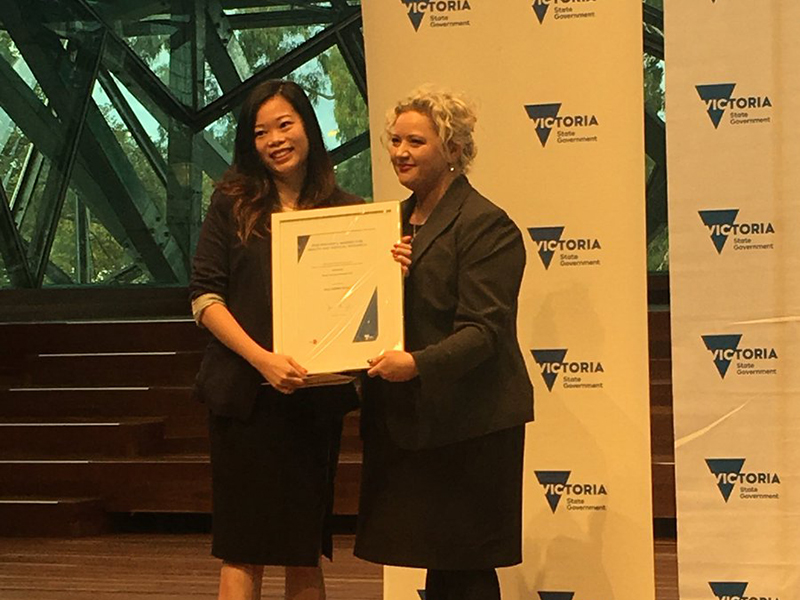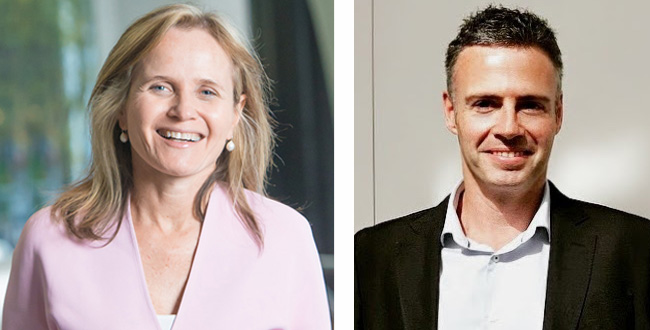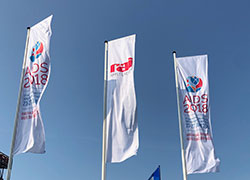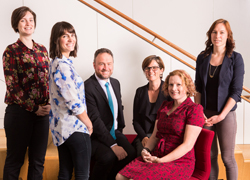24 Dec 2018
2018: a year in review
As the year draws to a close, we look back at all that was achieved by the Institute and it's staff, and students throughout 2018. We will be taking a short break, but will be back in 2019 to keep you up to date with all the amazing work that is happening. Wishing you a safe and happy holiday season.
January
The Hon Greg Hunt announced new grant funding across a range of Australia’s world-class research institutes, including $333,709 for the Doherty Institute’s Associate Professor Steven Tong to conduct Staphylococcus aureus clinical trials and research into infections in Indigenous communities.
Researchers produced the first conclusive evidence memory T cells proliferate and persist to fight future infections. The study, published in Nature Immunology, was supervised by University of Melbourne Dr Laura Mackay and Associate Professor Scott Mueller at the Peter Doherty Institute for Infection and Immunity, with co-authors from the John Curtin School of Medical Research, ANU.
February
Researchers revealed why flu vaccines work better in some people and made progress towards predicting the effectiveness of flu vaccines in the most vulnerable people. The research, published in Science Translational Medicine, and led by researchers at Melbourne’s Doherty Institute, may lead to more effective annual flu vaccines, help with choosing the best vaccines to protect at risk people, and could prepare the ground for a one-time, effective flu vaccine.
March
Dr Hui-Fern Koay was named joint winner at the 2018 Premier’s Health and Medical Resaerch Awards in the Basic Science Researcher category alongside Dr Tan Nguyen from the Walter Eliza Hall Institute and University of Melbourne. Dr Nicholas Gherardin and Dr Jason Kwong were also finalists.

April
A world first transmission intervention study to stop the spread of a flesh-eating bacteria in Victoria received the green light thanks to a $1.5 million Partnership Project grant from the National Health and Medical Research Council. Cases of mycobacterium ulcerans infection – or Buruli ulcer as it’s more commonly known – have been increasing exponentially in coastal Victoria, specifically the Bellarine and Mornington Peninsulas, with 275 cases recorded in 2017.
May
The The Global Virus Network (GVN) issued an Open Letter to the World Health Organisation calling for the eradication of potent human carcinogen, HTLV-1. Published in
An abbreviated version of the letter, Time to eradicate HTLV-1: an open letter to WHO, was published in The Lancet online. The full letter was published on the GVN website. The letter stemmed from discussions from the GVN’s 9th International Meeting which was held at the Doherty Institute in September, 2017.
A first of its kind study into the population and spread of tuberculosis-causing (TB) bacteria in Ho Chi Minh City, Vietnam, found that 59% of cases can be attributed to one particular strain of the bacteria, the Beijing lineage. Using state-of-the-art genomics technology, a Melbourne-led international collaboration, sequenced the DNA from bacteria isolated from the lungs of 1635 TB patients in eight districts of Ho Chi Minh City. The findings were published in Nature Genetics.
June
The Doherty Institute shined at NHMRC Research Excellence Awards, with two of the 20 awards going to Doherty Institute staff. Director, University of Melbourne Professor Sharon Lewin, Doherty Institute Director, and University of Melbourne Dr Daniel Pellicci, a Senior Research Fellow at the Institute, were identified as the top ranked Practitioner Fellow and RD Wright Biomedical applicants, respectively at a ceremony in Canberra tonight.
Dr Pellicci had a fantastic month, also winning the Commonwealth Health Minister’s Award for Excellence in Health and Medical Research for 2018 for his research on the ‘first responders’ of the immune system particularly the roles of cells known as unconventional T cells.
University of Melbourne Associate Professor Laura Mackay, Laura Mackay, a laboratory head and senior lecturer at the Doherty Institute, won the inaugural Michelson Prize for Human Immunology and Vaccine Research for her innovative work on tissue resident memory T cells.
The person behind the inception of the Doherty Institute, world-renowned immunonologist, Professor James McCluskey was been recognised in the Queen’s Birthday Honour list. Professor McCluskey received an AO, (Officer in the General Division of the Order of Australia) in recognition of his distinguished service to medical education, including as an academic in immunology, and through research into immune systems response to viruses.

Professor Sharon Lewin and Dr Daniel Pellicci receive NHMRC Research Excellence Awards
July
A strong Doherty Institute contingent headed to Amsterdam for the 22nd International AIDS Conference.
Kathy Jackson, Victorian Infectious Diseases Reference Laboratory (VIDRL) Senior Medical Scientist, was lead author on a paper examining the prevalence of hepatitis D infection in Australia, which was published in the Internal Medicine Journal.
August
Doherty Institute immunologist Dr Linda Wakim was awarded a prestigious Australian Research Council Future Fellowship, worth more than $800,000, for her research that aims to determine the role of exosomes in innate immunity.
Seven researchers from the Doherty Institute were awarded National Health and Medical Research (NHMRC) grants totalling $6.5 million. $3.3 million was provided specifically for essential research projects to be undertaken at the Doherty Institute.
An Early Career Fellowship were awarded to University of Melbourne Doctors Hui-Fern Koay and Claire Gordon, and Research Fellowships were awarded to University of Melbourne Professor Bill Heath and Professor Jose Villadangos.
Doherty Institute epidemiologist, Jennifer Maclachlan was named the inaugural winner of the Australasian Society for HIV Medicine (ASHM) Levinia Crooks Emerging Leader in Viral Hepatitis Award. Announced at the Australasian Viral Hepatitis Conference in Adelaide, the award places importance on fostering emerging leaders to continue to develop leadership that is bold, innovative, inclusive and that inspires collaboration in the sector.
Recruitment for the Doherty Institute’s Yiaga Ngarnga Scholarship, the Institute’s first ever Indigenous health PhD scholarship, began following the official launch at the From Bush to Bench Forum. Doherty Institute Director, Professor Sharon Lewin made the announcement before introducing a stellar line up of speakers presenting the latest research in Indigenous health.
A collaboration between the Doherty Institute and Austin Health discovered alcohol-based hand hygiene products and cleaning disinfectants are becoming less effective against the hospital superbug, vancomycin-resistant Enterococcus (VRE). VRE infections are notoriously difficult to treat because of their intrinsic and acquired resistance to many classes of antibiotics – Australia has one of the highest rates of hospital VRE in the world.

September
We held a book launch for Laureate Professor Peter Doherty’s 6th book, The Incidental Tourist. The Incidental Tourist is a collection of vignettes collected from four decades of globetrotting the world for scientific conferences. The book can be purchased from the Melbourne University Publishing website.
Doherty Institute clinician and genomic researchers, Professor Ben Howden and Dr Jean Lee uncovered a bacterium persisting in Victorian hospitals and around the world, capable of causing near untreatable infections. Published in Nature Microbiology, they looked at hundreds of Staphylococcus epidermidis isolates from 78 institutions in 10 countries around the world, and found three strain sub-types that have spread globally and are resistant to nearly all antibiotics. Most alarming was the discovery that some of the strains discovered in Europe are resistant to all known antibiotics.
October
Claire Gorrie wins prestigious Victoria Fellowship
Doherty Institute postdoctoral research fellow and bioinformatician Claire Gorrie, won a prestigious Victoria Fellowship. Claire uses whole genome sequencing on multi drug-resistant bacteria collected from Melbourne hospitals in order to identify potential transmission of these ‘superbugs’.
Dr Daniel Pellicci was awarded a $1.25 million, 5 year, CSL Centenary Fellowship to further research into how to develop better vaccines against diseases such as tuberculosis.
The University of Melbourne’s Professor Stephen Kent, a Laboratory Head in the Department of Microbiology and Immunology at the Doherty Institute, was one of 37 new Fellows elected by the Australian Academy of Health and Medical Sciences in recognition of their outstanding contributions to the health and medical community in Australia. Professor Kent was recognised for his work in the field of immunology, specifically in HIV.
Royal Melbourne Hospital Associate Professor Ben Cowie, Director of the WHO Collaborating Centre for Viral Hepatitis at the Doherty Institute and his team were awarded $1.6 million for a four-year project which aims to prevent liver cancer, the fastest increasing cause of cancer death in Australia.

The Cowie Group were awarded $1.6 million for a four year project. The following month they were named Melbourne Research Team of the Year.
November
Associate Professor Ben Cowie along with his dedicated and talented hepatitis research team were named the Melbourne Research Team of the Year at the Melbourne Health Celebrating Excellence Awards.
Associate Professor Laura Mackay appointed first female president of the Federation of Immunological Societies of Asia-Oceania (FIMSA).Founded in 1992, FIMSA is a non-profit organisation which seeks to advance the science of immunology in the Asia-Pacific region.
In November, Associate Professor Mackay was also awarded a $1.25 million, 5 year, 2019 Viertel Fellowship to further her research into co-opting the body’s existing immune cells to work against viruses and cancers.
University of Melbourne Professor Katherine Kedzierska, Head of Doherty Institute’s Human T cell Laboratory, was awarded the prestigious Woodward Medal in Science and Technology for her ground breaking work on H7N9 influenza and how the immune system responds to this deadly strain of bird flu.
The Institute signed a Memorandum of Understanding with Institut Pasteur Korea, strengthening collaboration between the organisation and encouraging research and technological cooperation.
December
Doherty Institute Research Officer Dr Maximilien Evrard was awarded one of 10 prestigious McKenzie Postdoctoral Fellowships from the University of Melbourne, for his innovative work on tissue resident memory T cell development and their role in fighting infections and cancer.
Researchers from the Doherty Institute received more than $11.5 million in the National Health and Medical Research Council (NHMRC) and Australian Research Council (ARC) funding rounds, including a Project Grant to tackle invasive fungal infections, a significant issue among immunocompromised patients.
University of Melbourne’s Dr Hamish McWilliam, postdoctoral researcher at the Doherty Institute was named as one of 43 individuals sharing in this year’s $1 million AMP Tomorrow Fund.


